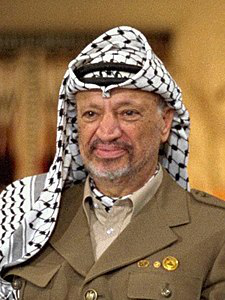

President of the Palestinian National Authority
Mohammed Abdel Rahman Abdel Raouf al-Qudwa al-Husseini 4 / 24 August 1929 Cairo, Egypt
11 November 2004(2004-11-11) (75) Clamart, Hauts-de-Seine, France
5 July 1994 – 11 November 2004
20th-century former Palestinian President, and Nobel Peace Prize recipient "Yasir Arafat" redirects here. For other uses, see Yasir Arafat (disambiguation). Yasser Arafatياسر عرفاتYasser Arafat awarded the Nobel Peace Prize in Oslo, Norway in December 19941st President of the Palestinian National AuthorityIn office 5 July 1994 – 11 November 2004Prime Minister Mahmoud Abbas Ahmed Qurei Succeeded by Rawhi Fattouh (interim)3rd Chairman of the Palestine Liberation OrganizationIn office 4 February 1969 – 29 October 2004Preceded by Yahya HammudaSucceeded by Mahmoud Abbas Personal detailsBornMohammed Abdel Rahman Abdel Raouf al-Qudwa al-Husseini 4 / (1929-08-24 ) 24 August 1929 Cairo, EgyptDied11 November 2004(2004-11-11) (aged 75) Clamart, Hauts-de-Seine, FranceResting placeArafat's compound, Ramallah, PalestineNationalityPalestinianPolitical partyFatahSpouse(s)Suha Arafat (m. 1990 )Children1ProfessionCivil engineerSignatureNickname(s)Abu Ammar Mohammed Abdel Rahman Abdel Raouf al-Qudwa al-Husseini (4 / 24 August 1929 – 11 November 2004), popularly known as Yasser Arafat (/ˈ æ r ə f æ t / ARR -ə-fat, also US: /ˈ ɑːr ə f ɑː t / AR -ə-FAHT ; Arabic: محمد ياسر عبد الرحمن عبد الرؤوف عرفات القدوة الحسيني ; Arabic: ياسر عرفات , romanized: Yāsir ʿArafāt) or by his kunya Abu Ammar (Arabic: أبو عمار , romanized: ʾAbū ʿAmmār), was a Palestinian political leader. He was Chairman of the Palestine Liberation Organization (PLO) from 1969 to 2004 and President of the Palestinian National Authority (PNA) from 1994 to 2004. Ideologically an Arab nationalist, he was a founding member of the Fatah political party, which he led from 1959 until 2004. Arafat was born to Palestinian parents in Cairo, Egypt, where he spent most of his youth and studied at the University of King Fuad I. While a student, he embraced Arab nationalist and anti-Zionist ideas. Opposed to the 1948 creation of the State of Israel, he fought alongside the Muslim Brotherhood during the 1948 Arab–Israeli War. Returning to Cairo, he served as president of the General Union of Palestinian Students from 1952 to 1956. In the latter part of the 1950s he co-founded Fatah, a paramilitary organisation seeking the removal of Israel and its replacement with a Palestinian state. Fatah operated within several Arab countries, from where it launched attacks on Israeli targets. In the latter part of the 1960s Arafat's profile grew; in 1967 he joined the PLO and in 1969 was elected chair of the Palestinian National Council (PNC). Fatah's growing presence in Jordan resulted in military clashes with King Hussein's Jordanian government and in the early 1970s it relocated to Lebanon. There, Fatah assisted the Lebanese National Movement during the Lebanese Civil War and continued its attacks on Israel, resulting in it becoming a major target of Israel's 1978 and 1982 invasions. From 1983 to 1993, Arafat based himself in Tunisia, and began to shift his approach from open conflict with the Israelis to negotiation. In 1988, he acknowledged Israel's right to exist and sought a two-state solution to the Israeli–Palestinian conflict. In 1994 he returned to Palestine, settling in Gaza City and promoting self-governance for the Palestinian territories. He engaged in a series of negotiations with the Israeli government to end the conflict between it and the PLO. These included the Madrid Conference of 1991, the 1993 Oslo Accords and the 2000 Camp David Summit. In 1994, Arafat received the Nobel Peace Prize, together with Yitzhak Rabin and Shimon Peres, for the negotiations in Oslo. At the time, Fatah's support among the Palestinians declined with the growth of Hamas and other militant rivals. In late 2004, after effectively being confined within his Ramallah compound for over two years by the Israeli army, Arafat fell into a coma and died. While the cause of Arafat's death has remained the subject of speculation, investigations by Russian and French teams determined no foul play was involved. Arafat remains a controversial figure. Palestinians generally view him as a martyr who symbolized the national aspirations of his people. Israelis regarded him as a terrorist. Palestinian rivals, including Islamists and several PLO leftists, frequently denounced him as corrupt or too submissive in his concessions to the Israeli government.

We use cookies
We use cookies and other tracking technologies to improve your browsing experience on our website, to show you personalized content and targeted ads, to analyze our website traffic, and to understand where our visitors are coming from. Privacy Policy.